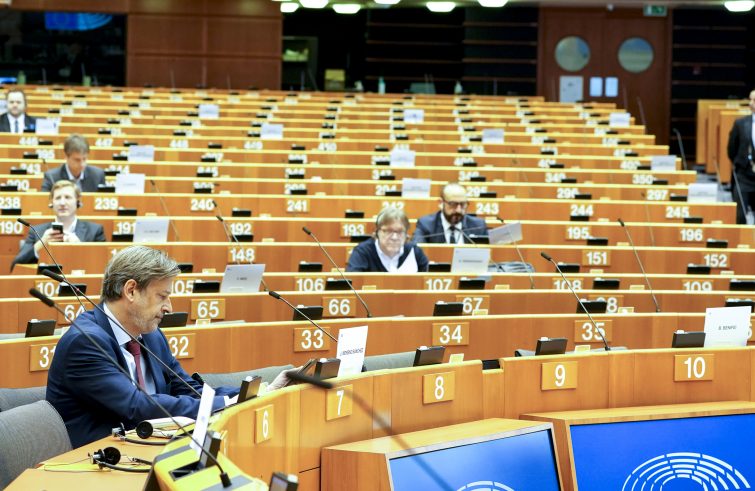
Coronabond or ESM? Absent or present Europe? Good or bad Germany? Should our present reality be read through the lenses of opposite extremes, without nuances, without gray areas? This epochal crisis – which no one had expected and for which no one was really prepared – is happening all over the world, leaving on the ground deaths, disease, new forms poverty. Grasping its full scope and combating it effectively would require (scientific) knowledge, prudence, and the willingness to understand and examine its manifold interrelated aspects. Only in this way can health, social, economic and relational responses be successful. The new global crisis we are facing requires – just like the recent ones, which are far from over, of sovereign debt, wars, migrations… – coordinated efforts within an international perspective. As has been pointed out many times, Covid-19 has brought to the fore a “small”, interconnected, fragile world whose challenges call for cooperation and solidarity; a world, the world of tomorrow, which will inevitably be different from the one we have inhabited so far.
Warnings to that effect abound. Pope Francis, having at heart the fate of the planet, said: “we cannot go on thinking of ourselves, but only together.” President Mattarella, addressing his thoughts to Europe, pointed out: “I hope that everyone fully understands the gravity of the threat posed to Europe before it is too late. Not only does solidarity form part of EU values, it also serves the common interest.”
So where is Europe? Here, too, we must distinguish between the powers and responsibilities of the European Union and those of the Member States, so as not to fall prey to petty forms of populism. By taking this approach we will realize that EU institutions have already embarked, not without efforts and delays, on the path of a common response in the areas of economy and health.
These include measures for the circulation of health equipment and food in the single market, funds earmarked for research (treatment and vaccine), control of flights and external borders, the allocation of EUR 37 billion from Community funds to support businesses; the go-ahead to State aid to give respite to the real economy, the suspension of Stability and Growth Pact regulations so as to guarantee unlimited national public spending. What is missing – which is why, on 26 March, the European Council, representing national leaders, ran aground – is the adoption of Eurobonds, which are technically preferable to the ESM – European Facility Mechanism, along with a concerted extraordinary investment plan to strengthen the entire productive and commercial fabric of EU Twenty-seven, capable of holding its own against world competitors of the calibre of China, the United States, India, Russia, Japan, Brazil and many others.
Mario Draghi’s statement to the “Financial Times” had had a very wide resonance, notably with regard to anti-crisis public spending. In fact, the former President of the European Central Bank had pointed to the need to give the States more leeway to introduce new and abundant resources into their economies in derogation of the (good) rules on deficit and public debt control. The same stance – based on financial reasons and the principle of solidarity – was taken by Christine Lagarde (after a serious slip-up) at the helm of the ECB, Ursula von der Leyen, Head of the EU Commission, and David Sassoli, President of the European Parliament. However, when it comes to putting their wallets on the table, it is precisely solidarity that alarms the governments of Austria, The Netherlands, Finland and – in certain respects – Germany, raising new barriers against those countries (Italy, France, Spain and many others) that are calling for prompt joint commitments to prevent the coronavirus from triggering a dramatic economic recession, with closed factories and an uncontrollable surge in unemployment and social poverty.
Will the 15-day deadline set by the EU Council for a decision to that effect prove Italy right and Germany and its partners wrong? That is not the only issue at stake.
The creation of Eurobonds (or coronabonds) – or resorting to the European Stability Mechanism – is no substitute for other obligations and implications that cannot be ignored. First of all, it is a question – whether bonds or ESM – of completing the Eurozone, coupled by effective economic and financial Euro governance. This in turn requires fiscal and budgetary policy alignment, bridging the development and competitiveness gap separating eurozone countries. Moreover, it must be noted that the desired financial interventions in derogation of Stability and Growth Pact regulations will further disrupt the budget of a number of countries, first and foremost Italy, whose impact will be felt (in the form of interests and rigorous reforms, starting with welfare and pensions) by future generations. That said, political cohesion, public spending, and solidarity, are direly needed.
Mauro Magatti wrote on ” Avvenire”: “Today Europe is standing at a crossroads. It can either bravely embark on the path of greater integration, thus paving the way for its own future (through, but far beyond, Reconstruction Bonds) or it will disintegrate in the grips of its own internal selfishness. In the delusional belief, ever re-emerging in the course of history, that the strong can be saved at the expense of the weak.” To avert its own collapse, Europe needs a greater degree of European integration. Nationalists must come to terms with this.









